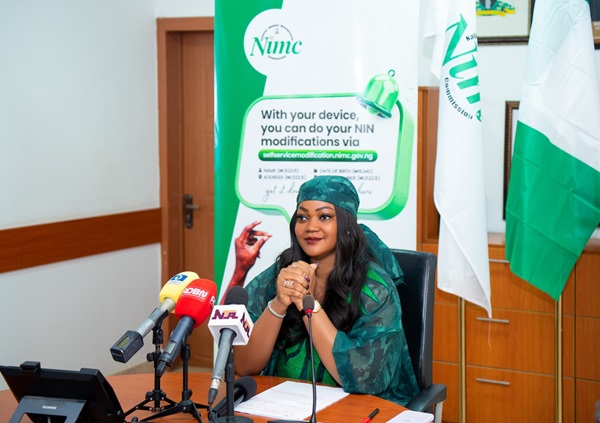
The Nigeria Identity Management Commission (NIMC) has announced its significant achievements since the appointment of its director-general, Abisoye Coker-Odusote.
During an inaugural press briefing at the commission’s headquarters in Abuja, Coker-Odusote revealed that the agency had enrolled 107.33 million Nigerians into the National Identification Number (NIN) database as of May 2023, which represents an increase of 3.18 million from the previous year.
NIMC also disclosed that it is working with government agencies to harmonise their identity databases to create a central database. The agency has already formed partnerships with 14 government institutions, such as the Central Bank of Nigeria (CBN), the Nigeria Immigration Service (NIS), banks, the Federal Road Safety Corps (FRSC), the Nigerian Communications Commission (NCC), among others.
A unique identity database for all Nigerians would unlock opportunities and harness resources for the country’s growth and development, according to Coker-Odusote. She added that with the expansion of opportunities of the unique identity database, Nigerians will have to pay a certain amount of money to get the new general multipurpose national identity card through finance institutions in the country.
Coker-Odusote revealed that applicants for the card would have to request their NIN through a self-service online portal or the banks. She added that applicants would have to pay through the banks to acquire the card. The commission has zero tolerance for crime and impersonation and is taking steps to address fraudsters impersonating its staff.
During the press briefing, the director-general explained that fraudsters masquerade as business vendors and cyber cafes, creating links for unsuspecting individuals, developing software, and fabricating fake NINs. This data does not reach NIMC’s server, resulting in numerous Nigerians falling victim to scams. She emphasised that the commission’s internal data breaches are minimal because it has one of the best in the world.
She also revealed that NIMC is working to expand the database to cover 250 million unique NINs for adults. She stated that they are upgrading the capacity across all boards, from the network infrastructure perspective to software licensing areas. This process will take a minimum of six to nine months, and the commission has already commenced that process. She further lamented that a lot of the commission’s equipment is outdated and needs to be replaced and upgraded.
When asked about the current capacity of the database, Coker-Odusote clarified that although the number of NINs recorded exceeded 100 million, which is the database’s capacity, some of the data are for children, not adults. Additionally, certain data, like fingerprints, are not collected from children, and the database is approaching its capacity limit.
The NIMC boss also noted that “NIMC has zero tolerance for crime and impersonation and has clamped down on a syndicate that impersonated NIMC staff at its annex offices. These criminals masquerade as business vendors and cyber cafes, creating links for unsuspecting persons, designing software and generating fake NINs for people. Many Nigerians have fallen victim to these scams”.
Coker-Odusote emphasised that the commission has arrested several offenders and they have no connection with the commission at all. She added that when they carried out their investigations, they discovered that many people around NIMC’s offices were parading as business vendors and cyber cafes, creating links for unsuspecting persons, designing software and generating fake NINs for people.
Meanwhile, experts have commended NIMC’s efforts, calling them “critical to Nigeria’s future, particularly in the areas of national security and economic development”. They also noted that the central database would be a reliable source of information for financial institutions, government agencies and other organisations.
However, some Nigerians have expressed concerns about the proposed payment to acquire the new general multipurpose national identity card. They claim that the government should provide the card for free or at a subsidised rate since it is a crucial document for Nigerians.
NIMC has achieved significant progress in enrolling citizens in the NIN database and is working to create a unique identity database for all Nigerians. NIMC is also collaborating with government agencies to achieve this objective. The agency is also taking steps to address fraudsters impersonating its staff. Experts have commended these efforts, stating that they are crucial to Nigeria’s future.


